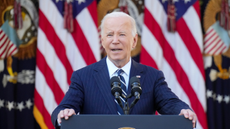A loser's approach to Medicare-for-all
Single-payer proponents are making a big strategic blunder


Presidential candidate and California senator Kamala Harris made headlines recently after seeming to tie herself in rhetorical knots over questions about Medicare-for-all. In separate statements Harris first said she supported the elimination of private health insurance, and then that she didn't.
The inconsistency can partly be chalked up to the usual limitations of trying to communicate complicated policy positions in short soundbites and the changing dynamic of the primary. And Harris isn't the only Medicare-for-all supporter who has been less than totally clear.
Yet it's also symptomatic of the broader Medicare-for-all movement attempting to have it both ways. Passing and implementing single-payer will require specific design choices that dictate financial winners and losers, but advocates have so far been unwilling to orient their politics accordingly. This is true as it relates to private insurers, but also especially in the case of the hospitals and specialists who owe their inflated profits to outrageous pricing schemes and abusive surprise billing practices.
Subscribe to The Week
Escape your echo chamber. Get the facts behind the news, plus analysis from multiple perspectives.

Sign up for The Week's Free Newsletters
From our morning news briefing to a weekly Good News Newsletter, get the best of The Week delivered directly to your inbox.
From our morning news briefing to a weekly Good News Newsletter, get the best of The Week delivered directly to your inbox.
Physicians for a National Health Program (PNHP), one of the most prominent single-payer organizations, has a vision for how they want Medicare-for-all to work. Their plan is that simplifying the way Americans pay for medical care would save a significant amount on paperwork. These administrative savings, plus some reduction in drug prices, would likely be enough to cover the uninsured and improve some benefits. And, although other single-payer countries spend roughly 10 percent of GDP or less on health care, they assume the United States will still spend around 17 percent of our GDP on health care, but just spend it more efficiently.
Dr. Adam Gaffney, president of PHNP, has made clear he doesn't put a priority on Medicare-for-all reducing our hospital spending or the income of American doctors, both of which are the highest in the industrialized world. Gaffney wants hospital spending to basically be frozen at what it is the year Medicare-for-all is adopted, with a promise to then save money down the line by slowing hospital growth.
Effectively, this is the same position of Congressional Democrats, who have so far avoided addressing the question directly in their proposed bills. In an op-ed earlier this month, Bernie Sanders attacked Partnership for America's Health Care Future saying, "they are insurance companies and the pharmaceutical industry's lobbying group," but left out the fact that hospitals and doctors are also represented by the organization. This is a pattern followed by Elizabeth Warren and others who often criticize insurance companies but rarely if ever talk about abuse or price gouging by hospitals.
The big problem is that, paradoxically, this approach of building out Medicare-for-all in the nicest possible way to hospitals actually incentivizes the strongest possible opposition from the health-care industry.
Single-payer groups used the same basic logic and spending design on the state level when they tried to pass California Proposition 186 in 1994, Oregon's Measure 23 in 2002, and Colorado's Amendment 69 in 2016. In that time span health care expenditures have risen from 13.3 percent of GDP to the more than 17 percent it is today.
Up to now, single-payer groups have effectively told hospitals they get to keep all their ill-gotten gains from however long it takes for Medicare-for-all to pass, but will be forced to live within those budgets afterwards. Each time hospitals help kill a single-payer effort, health care spending keeps rising and the next effort starts with the new inflated spending level as the baseline. See the problem?
There are only three ways to deal with a stakeholder when crafting legislation. You can straight buy them off by giving them more than they would have without the law. You can decide they can't be won over so you just need to fight them head on. Or you can force the stakeholder to reach a compromise by making them afraid that, if they don't work with you, something even worse for them will happen.
The current strategy for Medicare-for-all proponents vis-à-vis health care providers is none of the above.
While the PHNP approach is relatively nice to hospitals, it does call for reductions to hospital revenue in the future. At the same time, there is almost no effort to prepare for that fight by pointing out the insane prices they charge with no consistency or the fact that they are so comically bloated they don't even know what their procedures actually cost. And so far, instead of scaring hospitals into a negotiated compromise, single-payer groups have let hospitals know that walking away will always result in a better offer next time.
This has all the downsides of trying to buy off a major stakeholder with none of the benefits. By letting hospitals and specialists keep so much money, it makes it very difficult to make Medicare-for-all a clear financial winner for everyone else. To keep total health care spending the same, these previous state ballot measures required large income or payroll taxes roughly the same size as currently private health insurance premium spending.
The size of these new taxes kills the ability to build a large coalition. Even if many people with employer-provided insurance are able to fully understand how a new payroll tax would replace their current premiums and deductibles, many would see that as a wash. Similarly, for American businesses and many unions there is no gain. If the new payroll tax is the same size as premiums, Medicare-for-all would not make hiring American workers more cost competitive compared to other countries. At the same time, businesses and unions would lose a major worker retention tool.
Some in the Medicare-for-all movement seem to realize this. PERI researchers, in their plan to pay for Medicare-for-all, propose requiring employers to give the government only 92 percent of what they had been paying in private premiums. But without getting serious about hospital and doctor prices, that still doesn't generate enough revenue, so PERI also needed to include a large new national sales tax as well as a wealth tax. Tough to convince voters to support a new sales tax just to keep doctor salaries the highest in the world.
For comparison, public entities in the United Kingdom cover everyone while spending just 7.7 percent GDP. Public entities in the United States spend 8.5 percent on GDP to only partially cover about half the population. If we adopted UK level prices/salaries for providers we could not only provide universal coverage but also eliminate private premiums, deductibles, and cut government spending.
Health care costs are a top issue for voters. Polling shows the American people are open to transformative health reforms and ready to respond to a message about finally reining in prices. A poll last summer found 71 percent of Americans believed that hospitals charging too much is a major reason health care costs are rising, slightly more than the percentage who blamed health insurance companies.
A coalition of regular people and businesses can be built behind a plan like Medicare-for-all that is serious about bringing down prices, but only if the single-payer movement stops trying to half-heartedly win over hospitals and doctors. A strategy that gives hospitals so much money you need big tax increases but not enough to buy their support is a loser.
Sign up for Today's Best Articles in your inbox
A free daily email with the biggest news stories of the day – and the best features from TheWeek.com
Jon Walker is the author of After Legalization: Understanding the Future of Marijuana Policy. He is a freelance reporter and policy analyst that focuses on health care, drug policy, and politics.
-
 5 contentious cartoons about Matt Gaetz's AG nomination
5 contentious cartoons about Matt Gaetz's AG nominationCartoons Artists take on ethical uncertainty, offensive justice, and more
By The Week US Published
-
 Funeral in Berlin: Scholz pulls the plug on his coalition
Funeral in Berlin: Scholz pulls the plug on his coalitionTalking Point In the midst of Germany's economic crisis, the 'traffic-light' coalition comes to a 'ignoble end'
By The Week UK Published
-
 Joe Biden's legacy: economically strong, politically disastrous
Joe Biden's legacy: economically strong, politically disastrousIn Depth The President boosted industry and employment, but 'Bidenomics' proved ineffective to winning the elections
By The Week UK Published
-
 US election: who the billionaires are backing
US election: who the billionaires are backingThe Explainer More have endorsed Kamala Harris than Donald Trump, but among the 'ultra-rich' the split is more even
By Harriet Marsden, The Week UK Published
-
 US election: where things stand with one week to go
US election: where things stand with one week to goThe Explainer Harris' lead in the polls has been narrowing in Trump's favour, but her campaign remains 'cautiously optimistic'
By Harriet Marsden, The Week UK Published
-
 Is Trump okay?
Is Trump okay?Today's Big Question Former president's mental fitness and alleged cognitive decline firmly back in the spotlight after 'bizarre' town hall event
By Harriet Marsden, The Week UK Published
-
 The life and times of Kamala Harris
The life and times of Kamala HarrisThe Explainer The vice-president is narrowly leading the race to become the next US president. How did she get to where she is now?
By The Week UK Published
-
 Will 'weirdly civil' VP debate move dial in US election?
Will 'weirdly civil' VP debate move dial in US election?Today's Big Question 'Diametrically opposed' candidates showed 'a lot of commonality' on some issues, but offered competing visions for America's future and democracy
By Harriet Marsden, The Week UK Published
-
 1 of 6 'Trump Train' drivers liable in Biden bus blockade
1 of 6 'Trump Train' drivers liable in Biden bus blockadeSpeed Read Only one of the accused was found liable in the case concerning the deliberate slowing of a 2020 Biden campaign bus
By Peter Weber, The Week US Published
-
 How could J.D. Vance impact the special relationship?
How could J.D. Vance impact the special relationship?Today's Big Question Trump's hawkish pick for VP said UK is the first 'truly Islamist country' with a nuclear weapon
By Harriet Marsden, The Week UK Published
-
 Biden, Trump urge calm after assassination attempt
Biden, Trump urge calm after assassination attemptSpeed Reads A 20-year-old gunman grazed Trump's ear and fatally shot a rally attendee on Saturday
By Peter Weber, The Week US Published